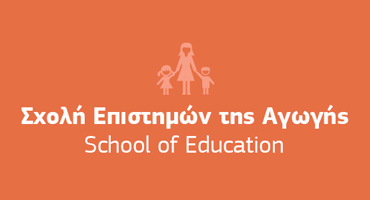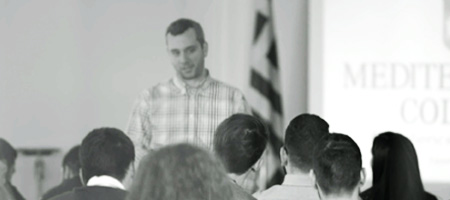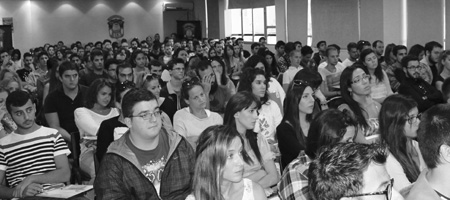





MA Education (TESOL): Teaching English to Speakers of Other Languages
-
Stimulating content grounded in 21st-century themes, trends and challenges in second/foreign language teaching and learning.
-
Designed to support aspiring, novice as well as experienced practitioners.
-
Creative, reflexive and experiential assignments. No written examinations.
-
Flexible delivery to meet multiple needs.
-
Developed in collaboration with the University of Derby, a UK university with a strong tradition and achievements in the field of Education (TOP15 in Guardian 2025).

Course Information
The MA in TESOL is designed for both aspiring, emerging and experienced language educators seeking to deepen their understanding of second/foreign language teaching and learning and educational research. This intellectually stimulating programme offers a dynamic exploration of TESOL, blending theory and practice across key areas such as second language acquisition, teaching methods, syllabus design, and educational policy. Students engage with evolving pedagogies—from audiolingualism to task-based learning and translanguaging—while addressing global issues like the role and use of technology and artificial intelligence in teaching and learning, multilingualism, and equity. The curriculum fosters inquiry into linguistic diversity, individual differences, and debates on native-speakerism and global Englishes. With a strong research focus, students develop the skills to undertake impactful projects, from exploring emerging technologies to shaping inclusive materials and policy, ensuring both scholarly depth and professional relevance.
What you will learn
In this master’s programme, you will first complete six specialised taught modules in TESOL and, then with the guidance of an expert supervisor, undertake a dissertation or an educational project on a topic of your choice—closely aligned with your academic and professional interests as well as your desired area of specialisation. Whether focusing on teaching innovations, language policy, or classroom practices, you will gain valuable research experience.
Through the programme, you will develop a solid foundation in applied linguistics and foreign language pedagogy, deepen your understanding of second language acquisition, and explore how educators respond to the learning needs of students from diverse backgrounds. You will also be trained in contemporary methodologies and practical approaches to teaching English in the classroom.
The course design and your interaction with fellow educators, students, and faculty will inspire fresh perspectives on your pedagogical approach while helping you refine your teaching practices for diverse learner populations. Moreover, you will have the opportunity to attend guest lectures, participate in special events, and—if you wish—present your work at the annual Mediterranean College Student Conference, strengthening your connection to contemporary developments in the field.
This programme provides a deep understanding of language learning and teaching, equipping you with the skills to excel in English language education. You will explore key differences between first and second language acquisition, examining linguistic, cognitive, and socio-cultural factors that shape learning. Through engagement with diverse teaching methodologies—from communicative and task-based approaches to technology-enhanced or mediated learning—you will develop expertise in evidence-based instruction.
A core focus is on individual learner differences, such as cognitive styles, motivation, and aptitude, alongside the impact of emerging digital technologies on language education. You will also explore curriculum evaluation, materials design, and assessment methods, gaining practical skills in adapting resources to diverse learners.
All modules are assessed only once, with no exams—only coursework projects tailored to your interests and career goals. You will receive individualized support from tutors throughout your studies. In the final phase, you will conduct a research project under expert supervision, investigating a TESOL-related topic of theoretical or practical significance.
Courses Description
In this module, you will explore how learners acquire a second, third, or even fourth language in addition to their mother tongue. You will examine key research and theories on Second Language Acquisition (SLA) and consider how these insights can inform teaching practice. Through analysis of diverse learner profiles, you will identify the needs of different language learners within the context of English Language Teaching (ELT). You will also develop an understanding of how learners' linguistic backgrounds influence the language learning process. Finally, you will investigate the roles of both the learner and the teacher in facilitating effective language acquisition. In this module, you will explore key theoretical approaches and methodologies that shape English language teaching, with a focus on developing linguistic competence in foreign language learners. You will examine influential methods such as Audio-Lingualism, Community Language Learning (CLL), and the Silent Way, assessing their role in fostering core language skills—phonology, vocabulary, grammar, and discourse competence. The module also covers contemporary approaches, including the Communicative Approach, Task-Based Learning (TBL), the Lexical Approach, and Content and Language Integrated Learning (CLIL), analysing how they support fluency, accuracy, and pragmatic competence. Additionally, you will evaluate models such as Present, Practice, and Production (PPP) in relation to their effectiveness in developing learners’ communicative abilities and overall proficiency. In this module, you will explore the structure and use of language in TESOL contexts, engaging with current debates from both cognitive and social perspectives in Applied Linguistics. You will examine how these discussions shape TESOL practice and reflect on your own professional experiences within the broader research landscape of English Language Teaching. Drawing on key theoretical frameworks, you will critically investigate issues such as the role of corpora in language learning, bilingualism, AI’s impact on language learning and teaching, and the relationship between language and thought. You will also explore sociolinguistic themes, including language and identity, the concept of the ‘native speaker,’ classroom interactions, language policy, and multilingual research methodologies. Through this module, you will develop a deeper understanding of how evolving linguistic theories and practices influence TESOL practitioners and the learners they teach. In this module, you will examine the evolving landscapes of syllabus and curriculum design in English Language Teaching exploring their benefits and limitations across different teaching contexts. You will develop the skills to design, evaluate, and adapt syllabi for real-world ELT scenarios, critically assessing various syllabus types, including structural, notional-functional, lexical, and task-based approaches. The module will also focus on materials development for diverse learner needs in EFL, EAP, and ESL settings, addressing key considerations in material adaptation and design. Additionally, you will engage with pedagogies of practice, including trauma-informed and resilience-based approaches, and explore assessment methods in ELT. Through this module, you will gain a comprehensive understanding of how curriculum and materials shape language learning and teaching in different educational contexts. In this module, you will explore changing contexts and landscapes as well as current debates in English Language teaching, with a focus on multilingualism, inclusion, and evolving learner needs. You will examine how shifts in language education impact teaching methods and classroom practices, engaging with topics such as translanguaging, refugee and asylum-seeker language provision, special educational needs and disability in inclusive education, and the role of technological advancements in modern language teaching. Special attention will also be given to teaching very young learners, exploring effective approaches for engaging and supporting this age group. You will reflect on key global issues, including English as a Foreign Language (EFL) vs. English as a Lingua Franca (ELF), intercultural competence, code-switching, and equality, diversity, and inclusion (EDI). In this module, you will develop the skills and knowledge needed to design a research proposal and undertake a Masters-level education project aligned with your specialist interests. You will explore literature, engage in methodological debates, and experiment with research methods to create a proposal for either an educational research study or a research-informed innovation addressing a contemporary educational challenge. You will examine how educational issues are constructed, the role of knowledge in driving change, and the impact of research and innovation strategies. Working with a supervisor-mentor, you will undertake an in-depth exploration of a topic of your choice, culminating in a significant research-based project. You will engage in planning, piloting, implementing, and reporting on your study, deepening your understanding of education policy or practice. Your project may take the form of a traditional research study (dissertation), or a research-informed artefact designed to address a contemporary educational challenge, such as a syllabus, teaching intervention, CPD materials, assessment tools, or policy guidelines. This module marks the culmination of your Master’s journey, providing an opportunity to contribute meaningful insights to the education sector. Language and Learning: Theory and Practice (20 credits)
The Principles of English Language Teaching (20 credits)
Contemporary Debates in Applied Linguistics (20 credits)
Curriculum, Pedagogy & Materials Development in English Language Teaching (20 credits)
The Changing Contexts of TESOL (20 credits)
Research and Innovation in Education (20 credits)
Extended Education Project (60 credits)
Admission Requirements
The programme is relevant to University or College graduates regardless of discipline but candidates with no University degree are also encouraged to apply for the programme. Factors like professional qualifications and evidenced experience in foreign language education, contribute to the admission of non-degree holders in the MA Programme (e.g. holder of a Certificate of Proficiency in English with significant teaching experience).
Very good knowledge of English (a minimum of IELTS 6.5 /CEFR B2 level or equivalent) is essential. If you do not hold an official language proficiency certificate, you will take the College’s diagnostic English language test.
Application & Enrolment
We use a rolling admissions policy, so we accept applications throughout the calendar year until all available places are filled. In order to secure your place in your selected course and class, we urge you to submit your application in time.
Requirements
- Copy of the latest degrees /certificate of studies.
- Very good knowledge of English (a minimum of IELTS 6.5 /CEFR B2 level or equivalent)
- Additionally, you will be required to submit a CV, reference letters from employers or professors, and attend an academic interview with the programme leader.
We also offer multiple fee payment methods, individual payment plans and bursaries based on academic, athletic and socio-economic criteria.
Contact us today and find out more about this course and the available bursaries and funding opportunities. Our admissions advisors will provide you with all necessary information and will guide you through the application and enrolment process.
- Content exclusively focused on foreign/second language teaching, learning, educational practice, and professional development.
- Designed to support aspiring, novice as well as experienced practitioners.
- A distinctive blend of theory, research, policy, and practice in second language learning and teaching.
- Equips future language educators with the skills, technology, and adaptability to excel in diverse learning environments.
- Designed to support aspiring, new as well as experienced practitioners seeking to deepen their knowledge and enhance their practice
- Creative, personalised assessments tailored to your interests and career goals—no written exams, only projects that highlight your strengths.
- Flexible delivery methods to accommodate diverse needs and preferences.
- Teaching approaches embrace digital technologies and flipped classroom practices to cater to various student needs.
- Learn from a dedicated team of linguists, TESOL and English Language experts who offer personalised guidance throughout your studies.
- Choose between an independent research dissertation or a practical teaching project, aligned with your academic and professional objectives.
- Flexible exit points: earn a Postgraduate Certificate (60 credits), Postgraduate Diploma (120 credits), or Master’s Degree (180 credits).
- Developed in partnership with the University of Derby, a UK institution ranked in the top 15 for Education (Guardian 2025). All University of Derby programmes in Education are rated ‘outstanding’ by Ofsted
- As part of the wider School of Education, you will have access to extracurricular activities such as study visits, guest lectures, conferences, and workshops.
- Engage with the MC Employability Scheme, enhancing your competitiveness in the job market.
- Recognised in Greece as professionally equivalent to degrees awarded by Greek state universities. It is also recognised by the UK NARIC as academic and professionally equivalent to any UK degree.
Degree recognition
Your degree is recognised in Greece as professionally equivalent to degrees awarded by Greek state universities. It is also recognised by the UK NARIC as academic and professionally equivalent to any UK degree.
Click here for more information on the degree recognition procedure by Greek authorities.
Careers
Holders of an MA TESOL degree can pursue various rewarding careers, including:
- English Language Teaching
- EFL Course Designing
- English Language Assessment Specialist
- Educational Consultation
- Editing
- Translating/Interpreting
- Publishing
- Journalism
Testimonials
I would describe my course in the graduate programme as a unique and valuable experience, at both educational and personal level. The specialisation in the field of learning disabilities was the goal and the means was personal work and proper guidance from notable and valuable fellow-teachers. The completion of this journey combines the happiness of personal satisfaction and the joy for the beautiful moments I spent with new colleagues who...
Violeta Pavgerou, MA Education: Special Educational Needs & Disability
With the education I received from Mediterranean college and my wise professors, I am now ready to explore and teach, not only in schools but my children one day! Thank you for the wonderful years I!!!...
Tran Mychie, BA (Hons) Early Childhood Studies
NOTHING WORTH HAVING COMES EASY... The road to get the Master degree was not easy ... With effort, help and moral support from my family and my beloved friends and fellow students, I managed to complete my graduate studies. HARD WORK + DREAMS + DEDICATION = SUCCESS ...
Panagiota Kokkinou, MA Education: Special Educational Needs & Disability




